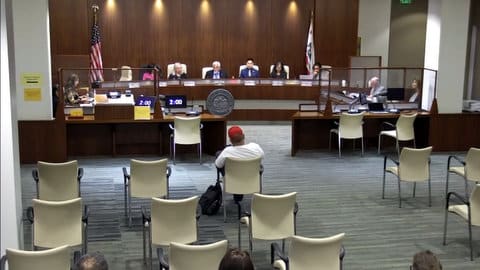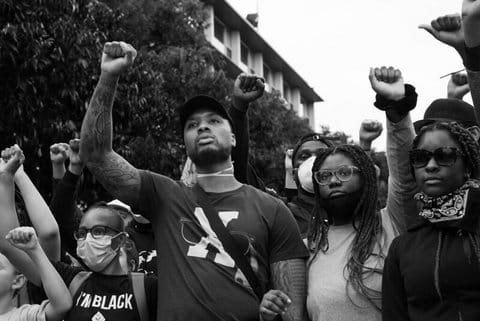
04 Oct Hate Groups Virtually Invade Richmond City Council Meeting

Richmond City Council meetings now allow in-person and virtual participation, the latter of which was exploited Tuesday by hate groups. (Screenshot captured by Samantha Kennedy / The CC Pulse)
By Samantha Kennedy
Richmond City Council’s Tuesday meeting became the latest public meeting targeted by hate groups.
During the public comment period, Zoom participants called into the meeting to make antisemitic and homophobic comments. The incident comes only weeks after the city councils of El Cerrito and Berkeley were hijacked by similar hate speech incidents.
Hate incidents at El Cerrito, South San Francisco, Berkeley and Walnut Creek council meetings sometimes became so bad that meetings had to be ended early. Though Richmond’s meeting did not see hate speech in the same amount as these cities, the Anti-Defamation League says these hate incidents are planned.
“These are not random attacks of bigots who happen to be in the community,” Anti-Defamation League’s Regional Director Marc Levine told KTVU in September. “These are orchestrated attacks on these public meetings.”
The emergence of virtual participation at council meetings allowed residents to participate safely during the pandemic but also let hate speech be used anonymously. Speakers use fake names and emails to hide their identities when speaking, according to the Anti-Defamation League.
One Zoom caller, whose screen name was pronounced as “Treblinka,” a death camp in Nazi Germany-occupied Poland, promoted an antisemitic hate group at the meeting, the Goyim Defense League. The group originated in Sonoma County and regularly disrupts public meetings with antisemitic harassment. “Treblinka” called on listeners to go to the group’s website and singled out one in-person speaker, Mark Wassberg, who frequently uses hate speech at council meetings.
The Goyim Defense League has been reported to provide its members with instructions on how to join meetings and what to say, particularly during its attack on Sonoma County’s Board of Supervisors meeting last month.
Another speaker falsely identified himself as “Gabe Stutman,” one of the editors at J. The Jewish News of Northern California who has reported on the Goyim Defense League. After mentioning Wassberg, the caller listed several statistics used by homophobic groups about the LGBTQ+ community.
Sarah Moore, who studies anti-LGBTQ extremism for the ADL and GLAAD, said last week at the Eradicate Hate Global Summit that over one-third of anti-LGBTQ attacks she looked at in her research were also antisemitic.
Wassberg spoke before the callers, making transphobic and homophobic comments. He targeted council member Cesar Zepeda, the city’s first openly gay male council member, with some of these comments. Wassberg was stopped from completing his comments. This sort of thing was par for the course for Wassberg who, in the past, also targeted Jovanka Beckles, who was Richmond’s first openly gay person on City Council.
Mayor Eduardo Martinez told Wassberg he could “talk about the issues” but was not allowed to “abuse the people on the council.” Martinez is not the first public official who has had to allow hate speech in a public forum to comply with the First Amendment.
After El Cerrito’s previous City Council meeting, Mayor Lisa Motoyama said shutting down certain hate speech could hurt the city. Motoyama told KTVU that speakers could bring a lawsuit against the city because it would violate the First Amendment. But Berkeley’s Mayor Jesse Arreguín had no problem shutting speakers down, doing so sometimes within seconds of a speaker’s initial comments.
In cases like Richmond’s, where slurs are not used, councils often have to allow hate speech because they cannot legally stop a speaker.
For example, while one of Richmond’s speakers read off a list of statistics about the LGBTQ+ community — including misleading numbers about the prevalence of domestic violence in same-sex relationships due to methodological issues and a 2016 article claiming nearly 100% of LGBTQ+ teens eventually change their identity — no slurs or calls for violence were directed at the community. This allows speakers to use flawed or debunked facts to support views that brand the LGBTQ+ community as promiscuous and violent.
Instead of preventing certain speakers from participating on Zoom, some jurisdictions are stopping the use of the platform entirely. Sonoma County’s Board of Supervisors has temporarily limited its public comment session to in-person comments and through email.
Some Richmond residents spoke in support of the LGBTQ+ and Jewish communities after comments were made.
Jamin Pursell, a member of the Richmond Rainbow Pride group, reminded the council that October is LGBT History Month and celebrated Zepeda for being the first openly gay man on Richmond’s City Council.
The next Richmond City Council meeting is Oct. 17.
For the record: A previous version of this story inadvertently identified Cesar Zepeda as the first openly gay Richmond City Council member. He is the first openly gay man on the council. The error has been corrected, and a line has been added acknowledging the council’s actual first openly gay member, Jovanka Beckles.
This resource is supported in whole or in part by funding provided by the State of California, administered by the California State Library in partnership with the California Department of Social Services and the California Commission on Asian and Pacific Islander American Affairs as part of the Stop the Hate program. To report a hate incident or hate crime and get support, go to CA vs Hate.






No Comments